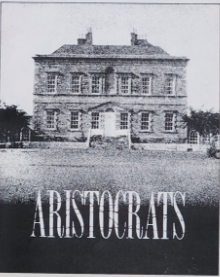
Do you get the feeling that if an Irish theater company were to mount a production of Neil Simon’s Barefoot in the Park, everyone from the dramaturg on down would come up with a thousand political subtexts? “The title,” they’d say, “represents Ireland walking with bare feet on the treacherous ground of English law. And the newlywed couple really stand for Northern Ireland and the Irish Free State, split apart by outside forces. And what about the foreigner (PLO) who seduces Cory’s mother (ITA), huh?”
People read what they want to into art, often arriving at little more than highly personal Rorschachs, but occasionally shedding light on a new dimension to the work in question. Irish playwrights seem to work overtime stuffing their plays with loaded metaphors, perhaps more as a defense mechanism than anything else. After all, an audience may think the dialogue slow and mundane, but maybe they’re missing a whole other level of the play. “These aren’t two characters talking to each other,” contends the playwright. “They’re two ideologies.” “Oh,” says the chastened audience, “we’ll play closer attention.”
One affords such concentration to Brian Friel’s 1979 drama, Aristocrats, not only because its political subtext is intentional, but because much of the writing is skillful. The play spends a long weekend with the O’Donnells, a disintegrating family living in dilapidated Ballybeg Hall, a once-impressive home in the County Donegal. We see the family through the eyes of Tom Hoffnung (well-played by the Richard Thomas-like Michael O’Neill), a visiting American writer whose work in progress charts the inevitable demise of old Irish Catholic families.
Material for Tom’s book abounds, as playboy Eamon (John Pankow) beats up his alcoholic wife Alice (Maryann Plunkett), timid Uncle George (Thomas Barbour) wanders about like a mute ghost afraid to respond to the living, senile Father (Joseph Warren) bellows into his intercom, pathological liar Casimir (Niall Buggy) imposes his dreamworld on everyone else, and stoic Judith (Robin Mosely) half-heartedly tries to hold the clan together. Brian Friel allows us to use Tom’s western eyes as binoculars, but he doesn’t focus the lenses. Tom falls into the background, and we’re left with a gaggle of unfortunate characters, talking each other to death.
Again, much of the talk has the ring of authenticity, and there’s a stunning monologue by Judith about the meaning she extracts from her ordinary routine—a superb reading by Ms. Moseley kicks the entire production up a notch—but there’s still too much blarney. The play’s denouement almost parodies itself as the collected characters steadfastly refuse to stop sighing their goodbyes and just go.
Thank goodness Aristocrats’s ensemble cast makes us feel we’re eavesdropping on an unhappy family rather than a long-winded dramatist. John Pankow, though a mite uncomfortable with his Irish brogue, accentuates Eamon’s likable qualities, leaving the womanizer’s ugly side to our fervid imaginations. Maryann Plunkett, in a real change of pace from her Tony-winning Sally in Me and My Girl, conveys resigned bitterness—though not quite enough fire—as acid-tongued Alice. As the insufferable Casimir, Niall Buggy carries a reminder of every stunted victim of loveless parents ever born. He makes Casimir’s joy in trivia (recognizing classical piano pieces, assigning spurious histories to family artifacts) and ingrained paranoia both annoying and pathetic.
Subbing for John Christopher Jones, Graeme Malcolm made a handsome, prototypically Irish Willie Diver, Judith’s love interest, while Tracy Sallows’s Claire is all deliberate naivete.
On first glance, John Lee Beatty’s excellent set is a grand mix of plush greens and antique furnishings. Only after looking closely do we notice the pervasive shabbiness.
Whether the O’Donnells represent the crumbling fabric of Irish life, a culture that folds in on itself and talks endlessly because action is pointless, or whether the play merely tells the story of a particular, fictional family, Aristocrats would benefit from serious paring and a decision on Brian Friel’s part as to which character merits the most concentrated attention. Only then will the playwright’s many promising scenes reach their full potential for irony and poignancy. Not to mention political resonance.
